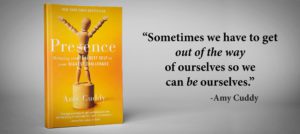Warren Alter of Alter Surety Group has recently recommended reading a book called Presence by Amy Cuddy. The work instructs people to bring their “boldest” self to face their challenges.
Of particular interest to us is one chapter on how to behave during an interview. Within this section, the author notes a correlation between intensive preparation for, and poor performance in, an interview. Why does this happen? Because the interviewees are not behaving as their “authentic selves”.
Cuddy defines the “authentic self” as a multi-faceted experience of living in the present moment while being mindful of what is important, expressed and reflected upon though one’s thoughts, values and behaviors. Your Authentic Self is dynamic and flexible, neither static nor rigid. It is responsive and open to growth.
When we prepare a candidate for interview, we advise him to be himself.
One of the sayings we share with candidates is this: “Accentuate the positive, eliminate the negative, and never lie”. We also advise candidates to respond to questions about their experience with relevant examples and anecdotes. Turning attention to these examples makes the interview more conversational in nature, and provides both interviewer and interviewee with the opportunity to expound upon particular topics, thereby clarifying whether the candidate would be the right fit. More specifically, it helps the hiring manager better understand the candidate’s abilities, and thus provide him with more tailored training.
An example of this may be illustrative. If the interviewer were to ask: “Do you have experience with buy-outs?”, candidates will often respond with, “Not really”, or “I have not been responsible for buying out a complete project.”
Rather than answering in this manner, it would be better to speak of experience you do have. For instance: “While building the Latitude project, we did not have the miscellaneous metal portion of the project bought out, and so I was responsible for the buyout from the field.” Stating what you have done demonstrates your understanding of the process, and demonstrates to the employer that you will not require full training on the buy-out process. The interview can then proceed organically to discuss your other experiences, as they would no longer be concerned about your understanding the buy-out process.
Honesty matters.
The Author of the book Presence, Amy Cuddy, is a Harvard Professor and Research specialist on human behavior. She states “When people lie, they are juggling multiple narratives: what they know to be true, what they want to be true, what they are presenting as true, and all the emotions that go along with each — fear, anger, guilt, hope.”
It is important to be able to verify your stated experience. To continue our previous example, the employer may respond by asking the name and contact information of the person to whom you reported during the Latitude project, in order to substantiate what you conveyed during the interview. References and work samples also help both you and the potential new employer ensure the job is right for you, and if it is, to provide the proper support necessary to be successful
If you want to know more about authentic self, or about how to read people’s body language and recognizer your own behaviors better, I highly recommend the book, as well as Amy Cuddy’s TED Talks.


